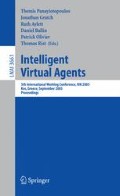Abstract
During the last years, Intelligent Virtual Environments for Training have become a quite popular application of computer science to education. These systems involve very different technologies, ranging from computer graphics to artificial intelligence. However, little attention has been paid to software engineering issues, and most of these systems are developed in an ad-hoc way that does not allow the reuse of their components or even an easy modification of the application. We describe an agent-based software architecture that is intended to be easily extended and modified. Also, some experiments to test the suitability of the architecture are shown.
Access this chapter
Tax calculation will be finalised at checkout
Purchases are for personal use only
Preview
Unable to display preview. Download preview PDF.
References
Lester, J.C., Stone, B.A.: Increasing believability in animated pedagogical agents. In: Proceedings of the First International Conference on Autonomous Agents, pp. 16–21. ACM Press, New York (1997)
Lester, J.C., Voerman, J.L., Towns, S.G., Callaway, C.B.: Deictic believability: Coordinating gesture, locomotion, and speech in lifelike pedagogical agents. Applied Artificial Intelligence 13, 383–414 (1999)
Rickel, J., Johnson, W.L.: Animated agents for procedural training in virtual reality: Perception, cognition, and motor control. Applied Artificial Intelligence 13, 343–382 (1999)
Rickel, J., Johnson, W.L.: Virtual humans for team training in virtual reality. In: Proceedings of the Ninth International Conference on Artificial Intelligence in Education, pp. 578–585. IOS Press, Amsterdam (1999)
Evers, M., Nijholt, A.: Jacob - an animated instruction agent for virtual reality. In: Tan, T., Shi, Y., Gao, W. (eds.) ICMI 2000. LNCS, vol. 1948, pp. 526–532. Springer, Heidelberg (2000)
Mendez, G., Rickel, J., de Antonio, A.: Steve meets jack: the integration of an intelligent tutor and a virtual environment with planning capabilities. In: Rist, T., Aylett, R.S., Ballin, D., Rickel, J. (eds.) IVA 2003. LNCS (LNAI), vol. 2792, pp. 325–332. Springer, Heidelberg (2003)
Mendez, G., Herrero, P., de Antonio, A.: Intelligent virtual environments for training in nuclear power plants. In: Proceedings of the 6th International Conference on Enterprise Information Systems (ICEIS 2004), Porto, Portugal (2004)
Sleeman, D., Brown, J. (eds.): Intelligent Tutoring Systems. Academic Press, London (1982)
Wenger, E.: Artificial Intelligence and Tutoring Systems. Computational and Cognitive Approaches to the Communication of Knowledge. Morgan Kaufmann Publishers, Los Altos (1987)
Munro, A., Surmon, D., Johnson, M., Pizzini, Q., Walker, J.: An open architecture for simulation-centered tutors. In: Artificial Intelligence in Education. Open Learning Environments: New Compu-tational Technologies to Support Learning, Exploration and Collaboration (Proceedings of AIED 1999: 9th Con-ference on Artificial Intelligence in Education), Le Mans, France, pp. 360–367 (1999)
Alpdemir, M., Zobel, R.: A component-based animation framework for devs-based simulation environments. In: Simulation: Past, Present and Future. 12th European Simulation Multiconference (1998)
Demyunck, K., Broeckhove, J., Arickx, F.: Real-time visualization of complex simulations using veplatform software. In: Simulation in Industry 1999. 11th European Simulation Symposium (ESS 1999), pp. 329–333 (1999)
Darken, R., Tonessen, C., Passarella, J.: The bridge between developers and virtual environments: a robust virtual environment system architecture. In: Proceedings of the SPIE - The International Society for Optical Engineering, vol. 2409, pp. 234–240 (1995)
Zambonelli, F., Jennings, N.R., Wooldridge, M.: Developing multiagent systems: The gaia methodology. ACM Transactions on Software Engineering and Methodology (TOSEM) 12, 317–370 (2003)
Fikes, R.E., Nilsson, N.J.: Strips: a new approach to the application of theorem proving to problem solving. Artificial Intelligence 2, 189–208 (1971)
Nau, D., Au, T., Ilghami, O., Kuter, U., Murdock, W., Wu, D., Yaman, F.: Shop2: An htn planning system. Journal of Artificial Intelligence Research (JAIR) 20, 379–404 (2003)
Gerevini, A., Saetti, A., Serina, I.: Planning through stochastic local search and temporal action graphs. Journal of Artificial Intelligence Research (JAIR) 20, 239–290 (2003)
Author information
Authors and Affiliations
Editor information
Editors and Affiliations
Rights and permissions
Copyright information
© 2005 Springer-Verlag Berlin Heidelberg
About this paper
Cite this paper
Mendez, G., de Antonio, A. (2005). Training Agents: An Architecture for Reusability. In: Panayiotopoulos, T., Gratch, J., Aylett, R., Ballin, D., Olivier, P., Rist, T. (eds) Intelligent Virtual Agents. IVA 2005. Lecture Notes in Computer Science(), vol 3661. Springer, Berlin, Heidelberg. https://doi.org/10.1007/11550617_1
Download citation
DOI: https://doi.org/10.1007/11550617_1
Publisher Name: Springer, Berlin, Heidelberg
Print ISBN: 978-3-540-28738-4
Online ISBN: 978-3-540-28739-1
eBook Packages: Computer ScienceComputer Science (R0)

